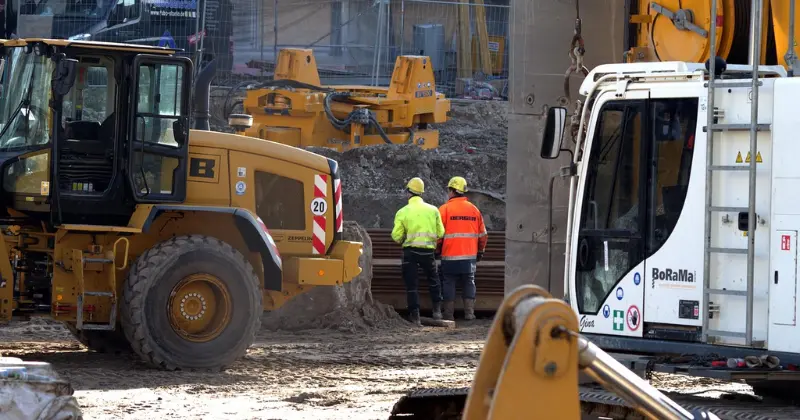11 mins read
The Role of a Construction Contracts Manager: Responsibilities, Skills, and Career Path

- What is a Contract Manager in Construction?
- What Does a Construction Contracts Manager Do? Key Responsibilities
- Key Construction Contract Manager Skills
- What Is the Construction Contract Manager Salary?
- How To Become a Construction Contracts Manager: Education and Career Path
- What Challenges Does a Construction Contract Manager Face?
- What Kind of Software Do Construction Contract Managers Use?
- Final Thoughts
Managing contracts is an essential component of every construction project. A construction contracts manager is responsible for supervising agreements, ensuring compliance, reducing risks, and building good relationships with all parties involved. Projects that are not well managed might have delays, cost overruns, and legal challenges.
This blog explores what a construction contracts manager does, the skills they need, what they typically earn, challenges in the field, and the software that helps them accomplish their job.
What is a Contract Manager in Construction?
A construction contract manager manages all contracts between customers, contractors, and suppliers linked with a construction project, and their main goal is to ensure that agreements are legally sound, financially sustainable, and aligned with project objectives.
To achieve this, they play a part in the construction bidding process by analyzing bids, determining project scope, managing change orders, securing site and equipment insurance, and ensuring the project is kept on budget, among many other things.
A construction contract manager maintains tight communication with contractors, team members, project managers, and other construction roles to analyze their material needs, negotiate anything that needs to be negotiated and resolve any difficulties that may arise – basically make sure the entire project runs smoothly from beginning to end. Contract managers also create standard processes for various departments to follow during the project’s lifecycle. To be successful in this role, you must have a thorough grasp of contracts, as well as the specific issues and restrictions that the building industry encounters on a daily basis.
What Does a Construction Contracts Manager Do? Key Responsibilities

Construction contracts managers are fundamental as they guarantee that projects run well, finances are protected, and all parties involved reach fair agreements. Without this role, projects could face legal battles, cost overruns, delays, and miscommunication among stakeholders.
Some of their primary contract manager responsibilities are:
- Drafting and Reviewing Contracts: Ensuring agreements address project scope, timing, costs, and compliance needs.
- Managing Contract Execution: Overseeing contract implementation and ensuring that all parties fulfill their responsibilities.
- Negotiating Terms: Collaborating with customers, suppliers, and subcontractors to reach fair and beneficial contract terms.
- Ensuring Compliance: Keeping contracts in line with legal, financial, and safety regulations to avoid risks.
- Construction Risk Management: Identifying and resolving possible contract conflicts before they escalate.
- Financial Oversight: Playing a part in effective construction budget management, by overseeing payment schedules, and cost variances to avoid financial discrepancies.
- Dispute Resolution: Handling contract-related problems and negotiating fair settlements.
In short, a contract manager ensures that any contract put in place supports the overall success of a project.
Key Construction Contract Manager Skills

A construction contract manager must have a wide range of skills to deal with the legal, financial, and operational complexities of their role.
- Legal and Regulatory Knowledge: Understanding construction rules, construction safety management standards, and compliance requirements ensures that contracts are enforceable and free of legal concerns.
- Contract Administration: Handling the whole contract lifecycle – from drafting to closeout – requires meticulous attention to detail and the capacity to handle several agreements simultaneously.
- Strong Communication Skills: Contracts involving several parties need good communication to relay expectations, manage conflicts, and successfully negotiate terms.
- Negotiation Skills: The position requires balancing the requirements of many parties and achieving fair and profitable agreements.
- Financial Acumen: A contract manager must understand project costs, payment timelines, and financial risks in order keep contracts under budget.
With the right combination of legal knowledge, strategic thinking, and financial expertise, contracts can serve as a foundation for successful project execution.
What Is the Construction Contract Manager Salary?
A construction contract manager salary varies depending on area, experience, and project complexity.
In the United States, the salary for a construction contracts manager ranges from $100 000 to $155 000 per year, while in the United Kingdom, a contract manager in construction typically earn between £45 000 ($58 000) and £77 500 ($100 000) a year. In Australia, the average yearly pay is between AUD 125 000 ($79 000) and AUD 145,000 ($91 600).
Additional benefits may include performance incentives, travel allowances, and professional development opportunities.
How To Become a Construction Contracts Manager: Education and Career Path
There are many ways to become a construction contracts manager. Many professionals begin in contract administration, project management, or gain quantity surveyor skills before moving on to contract management positions.
These are the typical steps along the career path for a contract manager in construction:
- Get a Relevant Degree: Many organizations prefer candidates with degrees in construction management, law, business, or engineering. Globally, you can pursue degrees in Construction Contractor Management, Law, Business, or Engineering, where you can study from bachelor’s to postgraduate levels. Keystone Bachelor Studies, for example, offers many degrees in these fields, including a Bachelor of Science in Construction Management and Engineering.
- Gain Industry Experience: Working in roles such as contract administration or construction procurement manager helps you to develop practical skills.
- Develop Specialized Skills: Certification in contract law, negotiation, or risk management gives you an edge in the industry. If you want to pursue global contract law certification, for instance, consider courses that focus on international trade law and cross-border transactions. These courses are offered by, for example, the ITCILO (International Trade Centre International Law Office), CIFILE, and Mercury Training.
- Get Promoted to Senior Roles: With more experience, professionals may take on larger projects and higher-level contract management responsibilities.
Remember also that a lot of employers appreciate experience as highly as formal education, and therefore hands-on experience is a crucial aspect of your professional development.
What Challenges Does a Construction Contract Manager Face?
Managing building contracts includes balancing legal, financial, and logistical responsibilities while ensuring that all parties involved fulfill their duties. Delays, disagreements, and regulatory revisions can all present significant obstacles that, if not handled properly, can result in legal action, financial pressure, and project inefficiencies.
The following are some of the most common problems encountered by a construction contracts manager and how they affect project execution.
1. Regulatory Complexity
Building contracts must adhere to local, state, and national laws, which include building codes, safety rules, environmental policies, and labor laws. However, these rules and regulations frequently change, which forces the construction contract manager to make changes that will correspond with the current compliance standards.
Key Challenges
- Frequent legislation changes may require contract amendments, which increases administrative workload.
- Companies that operate in many areas may find it challenging to maintain consistency in contract terms due to varying legislation across regions.
- Non-compliance might result in legal challenges, fines, and project delays.
How to Manage It
- Review and revise contracts on a regular basis to make sure they align with current regulations.
- Collaborate with legal professionals and compliance experts to maintain contracts in line with current legislation.
- Use contract management software to get real-time information on regulatory changes.
2. Disputes on Scope and Costs
Misaligned expectations among clients, contractors, and subcontractors can result in disagreements over project scope, cost estimates, and responsibilities. These conflicts can slow progress, increase expenses, and damage professional relationships.
Key Challenges
- Ambiguous contract wording may lead to misconceptions about project objectives, deadlines, and payment conditions.
- Unexpected cost overruns caused by material shortages, labor limitations, or design revisions may result in conflicts.
- Variations in project scope that are not properly documented and approved might lead to misunderstandings and financial disputes.
How to Manage It
- Define the scope, payment terms, and project milestones in the contract.
- Include construction change management procedures to track any changes to the original agreement.
- Implement cost management software (more on this below) to keep track of spending and avoid disputes over budgeting.
3. Tight Deadlines
Construction contracts set strict deadlines to keep projects on schedule, but delays caused by weather, issues with supply chains, or labor shortages can make it difficult to meet these contractual obligations.
Key Challenges
- Missing deadlines may result in financial penalties and strained client relationships.
- Supply chain concerns or staff shortages may result in unexpected delays.
- Poorly designed contracts may not account for contingencies, resulting in disputes over deadline extensions.
How to Manage It
- Set realistic project timelines with buffer periods for unexpected delays.
- Use project management software (more on this below) to track progress and identify bottlenecks.
- Create clear contractual provisions to handle delays and extensions.
4. Risk of non-compliance
Non-compliance with legal, financial, or safety requirements can result in heavy penalties, legal action, and damage to your reputation. Construction projects must follow strict compliance requirements, which vary depending on region, project size, and industry standards.
Key Challenges
- Frequent regulatory changes increase the risk of accidental non-compliance.
- Different stakeholders may perceive compliance standards differently, resulting in discrepancies.
- Failure to record compliance actions might complicate audits and inspections.
How to Manage It
- Centralize all compliance documentation and reporting in a digital contract management system.
- Designate compliance officers or legal advisors to make sure that they abide by industry regulations.
- Use risk management software (more on this below) to detect and minimize compliance concerns before they worsen.
What Kind of Software Do Construction Contract Managers Use?

Construction Contract Management Software
Contract management in the building industry requires careful attention to prevent financial and legal ramifications. RIB Candy streamlines the process by centralizing contract management, monitoring compliance, and maintaining financial records. With the capacity to track responsibilities and obligations in real time, project teams can minimize the risks associated with poorly managed agreements. By centralizing all contract-related data, teams can react swiftly to changes while maintaining control over the project’s finances.
Construction Collaboration Software
For projects to run smoothly, teams must work together efficiently. RIB Connex addresses communication barriers by offering a standardized platform for information sharing. Construction project managers, engineers, and other stakeholders can stay aligned on schedules, site conditions, and project updates. Having a shared space for conversation and document exchange eliminates misconceptions and increases overall productivity.
Project Management Software
Keeping construction projects on schedule requires meticulous management of activities, timelines, and resources. A structured system enables teams to allocate workloads, track milestones, and detect bottlenecks before they cause delays. With increased insight into deliverables, project managers can devote resources where they are most required, ensuring that progress remains steady from beginning to end.
Cost Management Software
Financial monitoring is one of the most difficult components of construction. RIB BuildSmart enables precise planning by giving up-to-date cost monitoring. Every expense, from labor to supplies, is documented in a manner that enables real-time adjustments. Preventing overspending requires ongoing knowledge of where funds are going, and this tool provides the transparency required to make projects financially stable.
Risk Management Software
Unexpected issues might lead to costly disruptions. A structured approach to identifying and mitigating risks prevents minor issues from escalating. By analyzing project data, teams can spot potential obstacles and adopt solutions before they cause delays or budget increases. Managing risks effectively allows for smoother project execution and better long-term outcomes.
Final Thoughts
Strong contract management is the foundation of every successful building project. Without it, even the best-planned construction projects may be derailed by delays, cost overruns, and legal disputes. The right strategies and technologies enable construction contract managers to retain control over agreements, compliance, and financial oversight, ensuring that all aspects of a project stay on track.
RIB Software offers digital solutions to simplify contract administration, boost collaboration, and keep costs under control. Whether it’s managing contract execution improving communication, or increasing financial planning, our solutions help construction teams make educated choices at all stages.
Get your free demo today and discover how professional construction contract management software can streamline project success from beginning to end!
Most Recent
11 mins read
11 mins read
10 mins read
10 mins read
Blog Categories

Ebook











